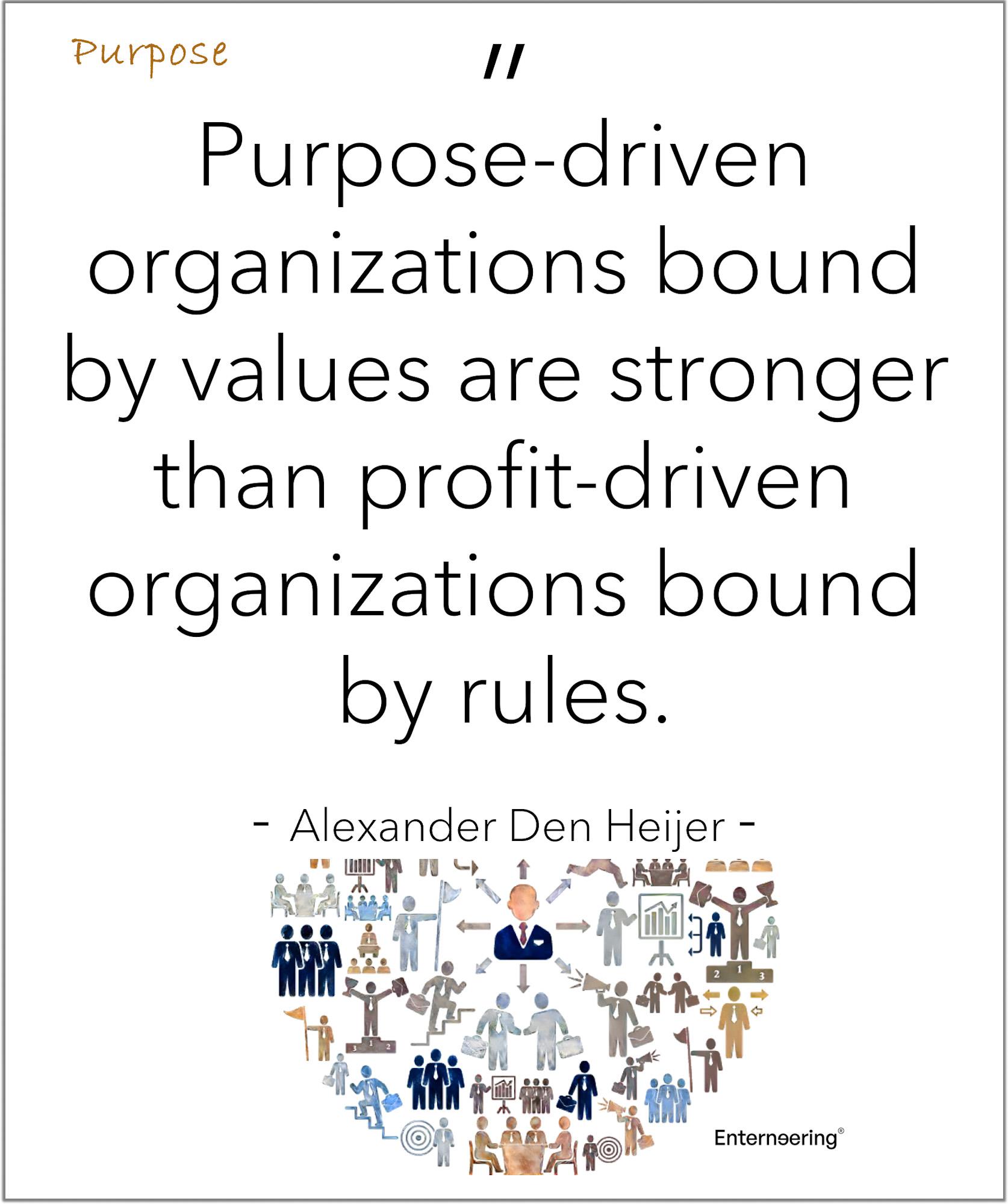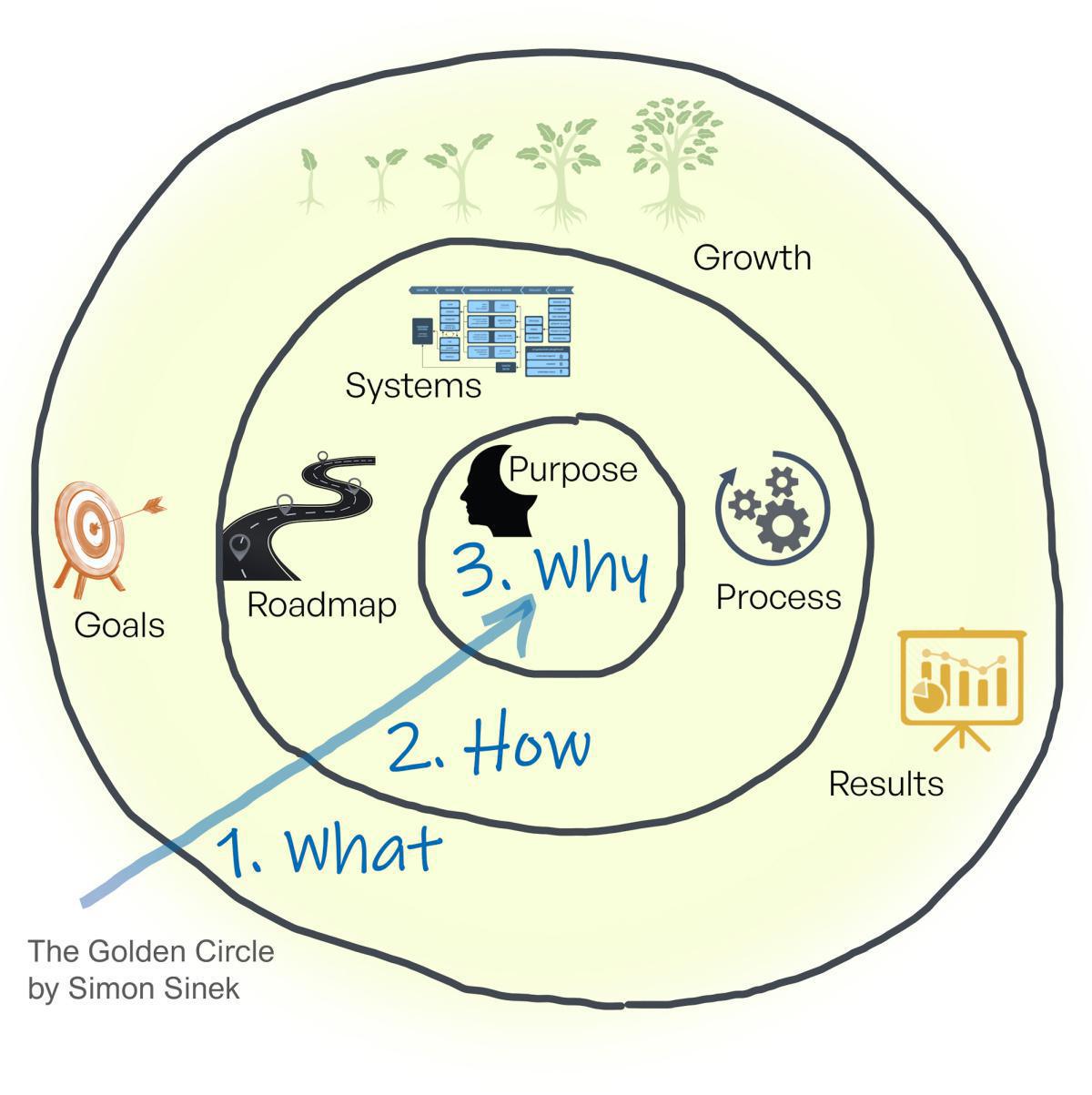Elements of Enterneering®/People/Purpose
In traditional business administration education, it has been, and still is, generally taught that the primary purpose of a company centres on quantitative principles such as profit maximisation and maximisation of shareholder value. Innumerable companies, including large corporations, still strongly gear their culture, leadership and organisation towards this. The world in which we live and work is undergoing massive changes in terms of digitalisation, climate change and resource shortages. In addition, younger generations have a different, more open and demanding understanding of the living and working spaces in which they must fulfil themselves or want to fulfil themselves. The more advanced, industrialised and prosperous a society is today, the greater the proportion of the population that is not only concerned with mere subsistence but also reflects on the purpose of work and life and has a desire to contribute to a greater cause.
Self-motivated individuals, who possess what is known as intrinsic motivation [⬈], who consciously and actively contribute to their work environments and who want to identify with these, need significantly more than sales targets, profit goals or share prices to feel a sense of connection. On the contrary, an increasing number of employees perceive these guiding principles as rather ordinary or quite generalised, and emotionally unappealing. This is especially true in locations where the demand for well-qualified workers exceeds the supply, due to demographic and economic developments. It is at this point that companies without a well-defined, authentically practised corporate purpose quickly find themselves at a competitive disadvantage. As they pursue their respective career paths, well-qualified candidates looking for meaningful jobs in service of a greater cause seek out employers who embody an analogous purpose. And it is these people who are also likely to emerge in the market as customers with similar requirements.
There is another important argument. Companies that fail to establish the authentic, visibly practised purpose currently being called for and instead focus on traditional one-dimensional targets such as turnover, earnings or returns will, sooner or later, have a high percentage of employees who can and want to live with precisely this situation in the longer term. This probably includes people for whom their income, regular working hours or having limited personal responsibility at the best possible salary and benefits are more important than innovative thinking and action, independent and solution-oriented work, and the assumption of personal responsibility in dynamic and change-rich jobs. Entrepreneurs must judge for themselves the types of people they want or need to employ – where, how and in what proportion – to achieve their strategic goals with the optimal team composition.

Entrepreneurs themselves should and must deal individually with the question of how relevant their corporate purpose is to the success they desire. There is no right or wrong, or better or worse decision. It remains an individual’s consideration and decision. But this has much to do with the leadership of the company and the corporate goals because the corporate purpose can be a sustainably positive element only if it is authentic.
SIGNS OF THE NEED FOR ACTION
If one or more of the following situations apply to your company, this may indicate deficits in the implementation of the corporate purpose:
- There is a notable proportion of employees who do not see the big picture of the actual purpose of their work, who discuss this with each other or who ask about it.
- In meetings, surveys or conferences, employees increasingly ask about the big picture or overall goal of the company.
- In the context of strategic development, managers emphatically and persistently question the meaning and purpose behind the financial figures.
- There is an increase in occasions where well-qualified applicants question the purpose of the company in job interviews more intensively.
- Candidates more frequently turn down job offers, stating that they are accepting a different job offer because it can provide more or allow them to make a greater personal contribution, or because they feel more emotionally involved with the other job.
- In the primary published corporate strategy documents, no explanation is given regarding the purpose of the company's existence.
- External parties (partners, advisors, friends, family) cannot clearly describe the meaning and purpose of the company.
As with most issues in Enterneering®, the issue of corporate purpose cannot be viewed in isolation from the other elements of the enterprise. It may require targeted questioning, careful listening and self-reflective action on the part of management to identify and define areas where action is needed. And a corporate purpose alone is not a cure-all. The first steps are awareness of the issue and a willingness to seriously and consistently address existing deficits.
DEFINITION OF PURPOSE
This refers to the meaning and purpose of a company beyond its monetary goals. While, in traditional business management, financial success is understood to be the primary purpose of a company, the definition of purpose in terms of human-oriented corporate management goes far beyond financial success. It describes the company’s raison d'être in a social, partially even global, context. In this modern understanding of a company, financial success is a basic prerequisite for the successful management of the company and is rounded out with the definition of the company’s intangible purpose.
In other words, financial success is like the air we breathe, while purpose is the emotional component of heart and soul. It is precisely this emotional component that is essential in organisations where there is a high degree of self-organisation, agility and new work. Companies with a sustainably integrated corporate purpose see themselves not only as profit-seeking market participants but as a part of society, with the responsibilities that come with this role. They no longer differentiate businesses from public or state institutions according to conventional patterns but see themselves as part of the entire social system. This makes it clear that as companies, they too bear the responsibility for such issues as the environment, climate, health and public infrastructure.
Corporate purpose differs from corporate vision and mission. The vision describes an aspirational, possibly idealised, image of the future, while the mission describes the self-image of the company in the present. Both are predominantly oriented towards the company. On the other hand, the corporate purpose goes beyond the boundaries of the company and reaches into the social spheres of life. It answers the question of why the company is needed in the first place, and what difference it makes to the world outside. Many companies have a vision and a mission but not a purpose. Some companies have such a strong purpose that they can successfully do without a vision or mission.
ARGUMENTS FOR A STRONG CORPORATE PURPOSE
PEOPLE MANAGEMENT AND LEADERSHIP
Companies without a strong or firmly anchored corporate purpose have to rely on individuals to assess and decide what is right and wrong, or desired and undesired. This approach centres around the egos, personal experiences and interests of individuals. This is a suitable approach in tightly hierarchical or autocratic structures and works in the longer term. However, it does not work in structures where a high degree of personal responsibility, self-organisation and agility is desired, and where silo thinking and acting in functional boxes are to be avoided.
Here, having a strong corporate purpose helps minimise individual interests and allows the overall goal or greater good to be pursued. In larger organisations, this also prevents individual departments from defining their own mission statements and the development of subcultures. Modern leadership in self-organised and dynamic structures needs a strong corporate purpose to create a powerful and motivated organisation.
RECRUITMENT AND TALENT
Companies looking to hire and retain well-qualified candidates are increasingly confronted with the need to offer more than just a nicely equipped workplace, a good working atmosphere, social benefits and adequate pay. More and more, people also value jobs with which they can personally identify and where they can make a tangible contribution. Companies with a strong corporate purpose can provide an important point of connection for their employees. Employee motivation and loyalty increase when there is a connection to the meaning and purpose of the company or the job, and where people believe they are serving a greater, higher cause. This is not only an advantage in recruiting and retaining staff but also in maintaining and increasing employees’ willingness to perform – even without having to constantly discuss financial incentives.
MARKETING AND SALES
A strong corporate purpose with significant external impact is a core element of smart marketing. It benefits companies who do not want their sales success to be achieved through traditional transaction-related 'pushing' but want to 'attract' customers through self-motivation on the basis of authentic and modern marketing. In an increasing number of markets, customers want to identify with the purpose of the salesperson. They want to be able to assess the meaning and purpose the provider of their goods and services fulfils. More and more, customers want to feel good about their purchases. Factors such as sustainability, climate protection, health and resource conservation are becoming increasingly important.
AGILITY AND FOCUSSING
A key feature of agile work is the ability of a company to implement the principle of self-organisation. Without a strong corporate purpose, self-organised working methods cannot be efficiently implemented. Successful self-organisation does not mean complete autonomy and uncontrolled decentralised decision-making. It entails a clear common direction and overarching guardrails. A jointly pursued, firmly anchored corporate purpose serves as the central point of orientation for all the employees of the company.
TRANSFORMATION AND CHANGE
For successful transformation of a company or change processes, it is crucial to enable the identification and orientation of the people involved in the process. This ensures that measures can be carried out in a focussed, well-thought-out manner. The increased dynamics and complexity in such processes can easily lead to high levels of uncertainty. A strong corporate purpose provides an important point of orientation and acts as a stabilising factor. It assists in maintaining an internal connection between the different areas of the company and the people who work there.
3 STEPS TO DEVELOPING A CORPORATE PURPOSE
1. REFLECTION AND DELIBERATION
Everything begins with honest self-reflection. Two questions are essential:
| ➟ | Is there any recognition at all that the implementation or further development of the corporate purpose has a high strategic value for the company? |
| ➟ | Is the company’s top management willing and able to authentically implement a strong corporate purpose? |
Both questions point in the same direction. Only those who clearly recognise the importance of purpose for themselves and their company, and who seriously want to develop or introduce this element should set out on this path. Those who favour authoritarian leadership structures or rely heavily on micromanagement in their businesses should carefully weigh the effort required to implement a strong corporate purpose. Ultimately, success depends decisively on the ability of the company's top management to authentically exemplify the corporate purpose and to take it into account in its everyday business deliberations and decisions.
| Note on practical application: A weak corporate purpose can have a more negative impact than having no defined purpose at all. Many people take such core elements of the company very seriously and are more disappointed if the purpose is not meant seriously or not reflected in the business activities. This can result in the company’s losing not only employees but also customers. |
If the decision is made to implement or further develop the corporate purpose, there should be no reason not to get started. As a rule, the process of deliberation is characterised by dialogue at the management level. These discussions are particularly fruitful if they are led and moderated by company owners and top management. If top management withdraws at this point, the whole issue suffers from a loss of authenticity.
2. STRUCTURING AND DISTRIBUTION
Developing a strong corporate purpose entails several structured passes or loops. To ensure good progress between these individual loops, it helps to define a simple but consistent structure, a 'process model'. The following is an example of a possible process model. The approach chosen here is characterised by the joint collaboration of a group of people (e.g. top management or mixed staff profiles). The group’s work begins with the 'golden circle'. The participants classify their statements about the purpose of the company in three concentric circles, from the outside to the inside, with 'What?', 'How?' and 'Why?'. According to the '5-Why' approach, the classification of the statements on the 'Why' is only done after questioning the 'Why' five times. This ensures that the core of the 'Why' is really penetrated.
In the search for purpose, it is sometimes difficult to put a concrete statement into words. A tool from the agile working world can help here: images. Images are known to be a key to our subconscious. It can therefore help to provide the participants with pictures or postcards and have them relate what associations these may have with the company's purpose.
Finally, the options derived from this process should be placed in the context of the most essential corporate pillars and assessed for compatibility. The most critical corporate pillars usually include the strategy, the people within the company (including their habits and behaviours), the capabilities of the company, the corporate culture being practised and any relevant external conditions. The simplest method for doing this is to assign points or grades to each option and company pillar.
| Note on practical application: The method or process model used is not of great importance. Much more important is the dialogue between the participants and the interaction that accompanies this. In most cases, a common group perspective quickly emerges, and even where there are different points of view, the chosen structure provides sufficient orientation and opportunity for joint evaluation. |
3. IMPLEMENTATION AND AUTHENTICITY
Since the entire topic of corporate purpose revolves around people, inclinations and emotions, the success of a strong purpose depends upon having it visibly and authentically anchored internally within the people who work for the company and, ideally, externally too. The corporate purpose must be embedded in the corporate strategy in such a way that there is compatibility, and no contradictions arise. The purpose must be made tangible. This means that employees, customers and business partners should not only understand the purpose but also be able to see that the company is really serving it.
| Note on practical application: Because our environments, markets, customers and employees continually evolve and change, the corporate purpose cannot remain static. It should be anchored in such a way that it remains a topic of conversation among the staff. Once the purpose is defined, the first step should, therefore, not necessarily be the creation of an image, a video or an advertising campaign. It is much more important to create the conditions that will allow employees to internalise the purpose and identify with it. It should become something they discuss among themselves and remind one another of. And they should be able to see that the top management has also internalised this purpose and is acting accordingly. Companies that succeed in doing this will have a strong corporate purpose, one that will inevitably spread beyond the boundaries of the company and produce a positive effect. |
CONCLUSION
The importance of a strong corporate purpose is still underestimated in many companies. In markets with a high degree of industrialisation and technology, however, it is probably one of the most important components of strategic corporate development.
Why is this such a big challenge? The answer lies in our past. For decades, economies of scale, rationalisation and increased efficiency have characterised the economic worlds of work. In these working worlds, a strong corporate purpose is not so crucial. But the digital transformation, pandemic-related resource and supply disruptions, climate change and demographic trends are bringing about enormous changes and fostering a new understanding in people of their environment, their purchasing decisions and their demands regarding work and leisure. Serious consideration of the corporate purpose requires foresight and patience. Entrepreneurs who invest their time and attention in this not only secure their competitive advantage but also protect their company from the risk of vanishing into purposelessness.
☝ Read the Field Trip 'Intrinsic Motivation remains the Key for Success' linked below.



